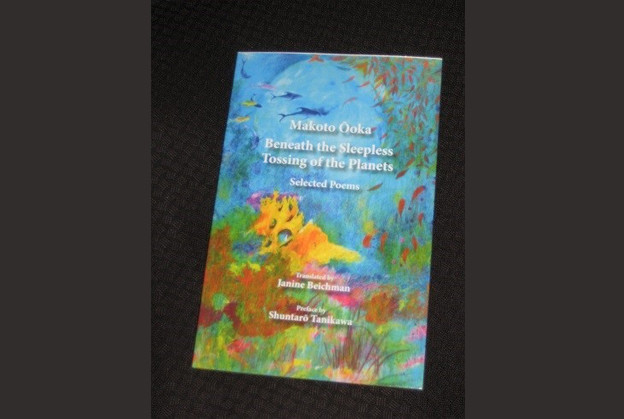Ōoka Makoto: from 'What Is Poetry?'
In 'Beneath the Sleepless Tossing of the Planets: Selected Poems'

Translation from Japanese by Janine Beichman
[The recent publication of Ōoka’s “selected poems” (Kurodahan Press, 2018) is a generous introduction in English to one of the leading figures of the Postwar Japanese Poetry generation. I have long kept in mind and often repeated his observation that “the demand ‘Bring back totality through poetry’ was common to every group and trend in postwar Japan until at least the 1960s.” And beyond that and elsewhere as well. (J.R.)]
What Is Poetry #1
Shi to wa Nani ka 1
It’s forever coming at me head on
from the opposite direction
but mostly I just step out of its path
and keep straight on
What Is Poetry? #2
Shi to wa Nani ka 2
It is not
child’s play
but the poet
is a child
What Is Poetry? #3
Shi to wa Nani ka 3
Precisely the process
by which all psychological scenes
proceed to total extinction
What Is Poetry? #4
Shi to wa Nani ka 4
It doesn’t study time
it ignores the colors of the sky
like a new born
frog
it leaps into time-space
the old pond
What Is Poetry? #6
Shi to wa Nani ka 6
Little things
reflected big eyes
Big things
come out small lips
What Is Poetry? #8
Shi to wa Nani ka 8
In the hollow of a hand that polishes
blades of grass, a faint light
in pure darkness
What Is Poetry? #10
Shi to wa Nani ka 10
The kitten
sits on a
plate
How deep is the fur
of those who live
naked
What Is Poetry? #12
Shi to wa Nani ka 12
To train a word
you must praise it
Even if praised to the skies
a word almost never sings
Hug the word tightly
stroke it softly
Until it releases two sighs
and long, trailing vowels
What Is Poetry? #15: The Case of a Star
Shi to wa Nani ka 15 — Hoshi no Baai
Heaven and earth are being created
One with the wind
a star’s light
is rubbing the root of a rock
that’s grown crystals
heating itself alone
What Is Poetry? #17: The Case Of Rain
Shi to wa Nani ka 17 — Ame no Baai
The rain —
drop on the leaf’s tip
firmly
pulls together
in the shape of a drop and then
as though sucked forth
lengthens out
all its weight
concentrated at
the trembling
tip
it falls
in the shape of firm decision
s
t
r
a
i
g
h
t
d
o
w
n
What Is Poetry? #21
Shi to wa Nani ka 21
Look at that pregnant puss
sinuously
shamelessly
fully content
rubbing her belly on bamboo grass
eyes narrowed in ecstasy
The essence of life
conservatism’s pulsating breath
is rubbing her belly on bamboo grass
eyes narrowed
in ecstasy
Ah this!
A wordless song
Shut up behind her eyelids,
penetrating sight
Carried behind in the temperate zone between her legs,
the pink, bad place, softly closed
What Is Poetry? #24: Rules For Its Creation And Interpretation
Shi to wa Nani ka 24 — Shi no Seisaku Kaidoku Kokoroe
Dreams:
Involuntary motions of the heart:
you don’t even know what you dreamed
until you wake up
When we paint or write
we never perceive the totality
of our creating The totality
resides in the future and the unknown
which is to say in dreams
An obscure marker is all we can see
The marker itself
takes on indeterminate shape
moment by moment
as the task of creation marches on
In one poem
is an irrepressible dream of flying
That
is the ache at the core of the pistil after fertilization
In one poem
is a dream of a butterfly’s escape to the blue empyrean
That is the wish to drown in scarlet flames
engulfing the body
To write a poem
to draw a picture
to fire clay —
awakening meditation
The relation of the marker and creative activity
may be compared to the conflict between
technique and air pressure
in trying to unite the head and tail
of an aerial oil pipe line
It was a whirlpool who first called
the straight line a straight line
It was a full circle who first murmured
“My own sweet arc!” to the half-circle
translator’s note. Ōoka Makoto (1931–2017) was one of the premier poets and critics of his generation in Japan and known abroad as an emissary of Japanese poetry and culture. Born in Mishima, a small city near Mt. Fuji, Ōoka began writing poetry in his teens. By the time he was twenty-five, his first books — one of poems and one of criticism — established him as a spokesman for contemporary poets. He often visited Europe, Asia, and the United States, lecturing and giving readings at the Collège de France, Harvard, Columbia, and Princeton Universities, as well as many literary festivals. His pioneering experiments with renga or linked verse, a traditional form of collaborative poetry, brought him into contact with poets around the world. President of Japan PEN Club from 1989 to 1993, he was also a prolific translator who helped introduce to Japan modern poets such as Paul Éluard, André Breton, and John Ashbery. For almost three decades, Ōoka’s daily column “Poems for All Seasons” ran on the front page of the Asahi newspaper, and through it poetry entered the daily lives of millions of readers in Japan. Ōoka’s works have also been translated into Chinese, Dutch, Estonian, Finnish, French, German, Korean, Macedonian, and Spanish.
Poems and poetics